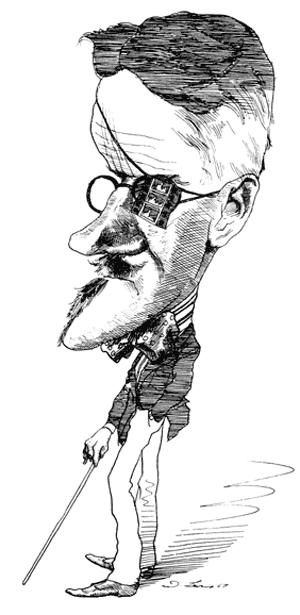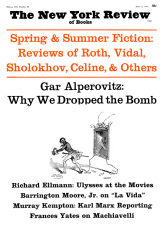That Ulysses should resist adaptation to a film is the latest instance of the book’s refusal to conform. Obsessed by language, it refuses to acknowledge that the age of reading is over and that the age of viewing has begun. Joseph Strick’s pious program note discovers Joyce’s contribution to modern literature in “the idea that there are different sorts of reality,” “that the life of the mind—ideas, dreams and fantasies—is no less real than the life of the body.” But all literature has battened on this idea. If it is new to the studio, that is because the camera has to assume, as words do not, that palpable surfaces are primary. What Joyce, distinctively, presented was a multiplication of linguistic perspectives, which included the questioning of its own method, of language itself. Through this Babel his characters scarcely move, conserving their energy to affirm only the power to express.
Perhaps for that reason, the book has weighed heavily on the script writers, who keep an awed look on their faces even as they tear out most of its pages. The film begins well, with a clever counterpoint between the first three chapters about Stephen and the next three about Bloom. But the rapidity of scene changes becomes troublesome, as if the audience were repeatedly being told, “Well, you get the idea,” and were then bundled off to another part of Dublin. What in Joyce is deliberately strolling and pointillistic becomes breathless and kaleidoscopic. The sensation of being treated to excerpts is obtrusive. As for the analogy with the Odyssey, which might offer the principal avenue by which the film could do what Joyce could not do, this is dropped except for the black patch worn by the Cyclopian Citizen. The epic contracts into a domestic comedy.
What is presented is not so much a digest as an anthology of Ulysses. Even an anthology would be defensible. But with all its small boldnesses, the film displays a new kind of bowdlerizing. Instead of expurgating the body, it expurgates the mind. Masturbation is in, cogitation is out. The discussion of Hamlet in the library is censored away, as is the discussion of rhetoric in the newspaper episode. Even more painfully, the medical students in the lying-in hospital are rowdy boys rather than lewd scholars, and sing bawdy catches instead of talking. Here occur some of the rare and infelicitous interpolations, as when Stephen chants a liturgical bit and adds the tag “Stick it up your arse,” which is quite out of keeping with his euphuism. Except for some phrases from the Proteus episode, such as “Ineluctable modality of the visible,” the film maintains the intellectual level of a Hemingway rather than a Joyce novel. So Molly’s monologue, because it is female and physical, is granted a much larger portion of the film than of the book. Those matters at least we can be depended upon to understand. But mind is close to being taboo.
THE WORST sufferer from this new form of censorship is Bloom himself. The scenario by Strick and Fred Haines seems to derive from post-Joycean treatments of the Jew as noble victim. Joyce allows Bloom something of this role, but he also equips him with the internal armor of a comic and poetic imagination. Bloom is undeceived and funny in all that he says about forms of behavior, about science, religion, social reform. He has an extraordinary talent for composing his thoughts into memorable language, not in conversation but in the mind’s eye. To deprive us of Bloom’s monologue, as the script almost totally does, is to leave out nine-tenths of Bloom, keeping only the inane residuum. Without with or verbal dexterity, with his naughty habits somewhat mitigated in spite of the vaunted outspokenness, Bloom becomes a lovable slob. He is that very “common or garden” variety which Lenehan attests to his not being. So wilted is this Bloom that people keep calling him by his first name, though Joyce makes a point of having nobody but Molly do this, and even to her Bloom is usually only “he.” In the reduced version of the leading character, Milo O’Shea acts very well, keeping a bourgeois affability in unseemly postures. But Bloom is prevented by the script from transcending his situation by comment; all he can do is sink deeper into it.
The film makers have also been bothered by Stephen’s unsmiling quality, and have chosen to readjust him as a much more amiable fellow. Maurice Roeves, who takes this role, grins intolerably at his own bright remarks. Like Bloom, he is reduced in significance. The difficulty stems in part from using Dublin in its post-revolutionary present rather than in its pre-revolutionary past of 1904. There is no hated occupying power in Dublin Castle, and Stephen is at peace with the Irish Government. As to religion, his blasphemies (which are more restrained than the obscenities in the film) are not startling in an ecumenical era. It would be excessive for such a young man to say, tapping his brow, “But in here it is I must kill the priest and the king,” and in fact he doesn’t in the film. The sharp edges of denial are muffled by omission of most of his rebellious lines. If Stephen, while an odd stick, is a good sort, he must have some more direct antagonist. For this purpose Mulligan is deprived of his robust gaity and made just malevolent; instead of asking Stephen for the tower key, he filches it; he snaps a towel at Stephen’s shanks, flashes a mirror in his eye. Again, the psychic duel is reduced to a physical one, only epidermal cruelties count, and Stephen seems to accommodate himself to everyone in Dublin except Mulligan.
Advertisement
As the film winds into Nighttown and Bella Cohen’s brothel, one expects that it will become more savage and phantasmagoric, but instead it becomes only more comic. The camera is used chiefly to effect rapid transformations of Bloom; it does not evoke the eeriness, or the painfulness, of the unconscious. Mr. Strick hasn’t taken enough risks here: this unconscious is only a masquerade, a Capote party. We can be sure that everyone will change back in time to sign the guest book. Though Anna Manahan is a good Bella Cohen, her brothel lacks frenzy. Out of it the film proceeds, without stopping at the cabman’s shelter, to 7 Eccles Street. The script writers have had the wit to let Joyce’s unseen narrator speak the questions and answers of the Ithaca episode. Once home, Bloom asserts himself; he not only orders breakfast in bed, as in the book, but also takes Molly’s underwear, which in the morning he had pretended to try on, and tosses it manfully in her face. There seems no harm in these changes, though they insist more on domestic resolution than Joyce did.
AFTER BLOOM nods off, we are left with Molly. Barbara Jefford’s speech lacks some of the unquenchable disorder prescribed by Joyce, and has an unfortunate edge of cultivation. She performs the role with talent nonetheless. It is not her fault that the monologue is not really translated into film, or that the audience is taken by verbal rather than by visual surprise. The visual images, which include a few shots of Lt. Gardner, of Gibraltar, and, gratuitously, of Indian nature goddesses, catch little of the slide and drift of the words. Molly tends to blend all her gentleman friends, including her husband, into a single, rather unsatisfactory, composite male, and one would expect some radical montage, especially since Eisenstein said he learned much of his technique from Ulysses. But little is offered, and, curiously, the film is linear whereas the words leap backwards and forwards and together. Mr. Strick comes down hard, harder than Joyce, on the final memory of Molly’s being kissed by Bloom among the rhododendrons on Howth, though the rhododendrons themselves seem to have long since spent their passion. Perhaps the extras trampled them.
The tenor of the film is more unqualifiedly humanistic than the book’s, where the heat is accompanied by a certain amount of cosmic chill. After all, the embraces reviewed by Molly occurred sixteen years before this bout of insomnia. The film is not without conscience, but it has no innovations commensurate with those of its original. It is perhaps clear why Joyce dallied with various producers but never gave the film to any of them. What Mr. Strick has done is at any rate not contemptible. Committed readers of the book may have the pleasure of disagreeing with the film and of imagining a better scenario. The latest Joyce game is a good one.
This Issue
June 15, 1967




